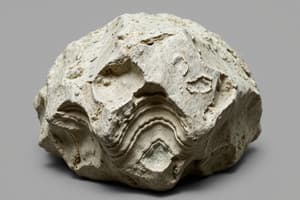Podcast
Questions and Answers
What is precipitation?
What is precipitation?
- Air pressure changes
- Ocean currents
- Water vapor in the atmosphere
- Rain, snow, sleet, or hail that falls from clouds (correct)
What does the term 'world ocean' refer to?
What does the term 'world ocean' refer to?
- The Atlantic and Indian Oceans combined
- The Pacific Ocean only
- A single, large interconnected body of water that covers 70% of Earth's surface (correct)
- An ocean with distinct boundaries
What are aerosols?
What are aerosols?
Tiny liquid droplets found in the atmosphere
What is conduction?
What is conduction?
What causes an earthquake?
What causes an earthquake?
What is the ionosphere?
What is the ionosphere?
What is evaporation?
What is evaporation?
What is the deep zone in the ocean?
What is the deep zone in the ocean?
What is Earth's innermost compositional layer called?
What is Earth's innermost compositional layer called?
What are tributaries?
What are tributaries?
What includes all the water on or near Earth's surface?
What includes all the water on or near Earth's surface?
What is the deepest point on the ocean floor?
What is the deepest point on the ocean floor?
Which of the following is NOT one of the physical layers of Earth?
Which of the following is NOT one of the physical layers of Earth?
What does the energy released by an earthquake occur in the form of?
What does the energy released by an earthquake occur in the form of?
What is the melted rock that forms a volcano called?
What is the melted rock that forms a volcano called?
What are wind and water erosion NOT likely to affect?
What are wind and water erosion NOT likely to affect?
Where is most of the fresh water on Earth located?
Where is most of the fresh water on Earth located?
Which of the following is Earth's densest atmosphere layer?
Which of the following is Earth's densest atmosphere layer?
In equal volumes of ocean water and fresh water, ocean water may be expected to contain more of what?
In equal volumes of ocean water and fresh water, ocean water may be expected to contain more of what?
Which of the following is NOT a mechanism of energy transfer through or within Earth's atmosphere?
Which of the following is NOT a mechanism of energy transfer through or within Earth's atmosphere?
What is the thermocline?
What is the thermocline?
What are tectonic plates?
What are tectonic plates?
What is a volcano?
What is a volcano?
What is radiation?
What is radiation?
What are surface currents?
What are surface currents?
What is the mantle?
What is the mantle?
What is ozone?
What is ozone?
What are tributaries?
What are tributaries?
What is salinity?
What is salinity?
What is a fault?
What is a fault?
What is the part of Earth that contains the air we breathe called?
What is the part of Earth that contains the air we breathe called?
What is the outermost layer of the solid Earth called?
What is the outermost layer of the solid Earth called?
How much more energy does an earthquake of magnitude 5.0 release than one of magnitude 4.0?
How much more energy does an earthquake of magnitude 5.0 release than one of magnitude 4.0?
Where do volcanoes occur at tectonic plate boundaries?
Where do volcanoes occur at tectonic plate boundaries?
What is erosion?
What is erosion?
What is the stratosphere?
What is the stratosphere?
Which gas is an important greenhouse gas?
Which gas is an important greenhouse gas?
What is the most abundant gas in Earth's atmosphere?
What is the most abundant gas in Earth's atmosphere?
What is convection?
What is convection?
What is the warmest temperature zone of the ocean?
What is the warmest temperature zone of the ocean?
What are deep currents?
What are deep currents?
What is one of the most important roles of the ocean?
What is one of the most important roles of the ocean?
What is the biosphere?
What is the biosphere?
With respect to matter, Earth is mostly what?
With respect to matter, Earth is mostly what?
What are the most important dissolved elements in ocean water?
What are the most important dissolved elements in ocean water?
Flashcards
Precipitation
Precipitation
Rain, snow, sleet, or hail that falls from clouds; crucial for the water cycle.
World Ocean
World Ocean
A vast, interconnected body of water covering 70% of Earth's surface; vital for climate regulation.
Aerosols
Aerosols
Tiny liquid droplets suspended in the atmosphere; can affect weather and climate.
Conduction
Conduction
Signup and view all the flashcards
Earthquake
Earthquake
Signup and view all the flashcards
Ionosphere
Ionosphere
Signup and view all the flashcards
Deep Zone
Deep Zone
Signup and view all the flashcards
Troposphere
Troposphere
Signup and view all the flashcards
Stratosphere
Stratosphere
Signup and view all the flashcards
Mantle
Mantle
Signup and view all the flashcards
Evaporation
Evaporation
Signup and view all the flashcards
Salinity
Salinity
Signup and view all the flashcards
Fresh Water Sources
Fresh Water Sources
Signup and view all the flashcards
Thermocline
Thermocline
Signup and view all the flashcards
Surface Currents
Surface Currents
Signup and view all the flashcards
Tectonic Plates
Tectonic Plates
Signup and view all the flashcards
Volcano
Volcano
Signup and view all the flashcards
Fault
Fault
Signup and view all the flashcards
Erosion
Erosion
Signup and view all the flashcards
Greenhouse Gases
Greenhouse Gases
Signup and view all the flashcards
Biosphere
Biosphere
Signup and view all the flashcards
Radiation
Radiation
Signup and view all the flashcards
Convection
Convection
Signup and view all the flashcards
Seismic Waves
Seismic Waves
Signup and view all the flashcards
Salts in Ocean Water
Salts in Ocean Water
Signup and view all the flashcards
Closed System
Closed System
Signup and view all the flashcards
Study Notes
Key Terms and Concepts
- Precipitation: Includes rain, snow, sleet, or hail that falls from clouds; crucial for Earth's water cycle.
- World Ocean: A vast, interconnected body of water covering 70% of Earth's surface; plays a vital role in climate regulation.
- Aerosols: Tiny liquid droplets suspended in the atmosphere; can affect weather and climate.
- Conduction: The transfer of heat between objects in direct contact; fundamental in heat exchange processes.
- Earthquake: Vibrations caused by the sudden movement along a fault line; significant natural occurrence with potential for destruction.
Atmospheric and Oceanic Layers
- Ionosphere: A layer in the lower thermosphere; important for radio communication.
- Deep Zone: The bottom layer of the ocean extending from the thermocline to the ocean floor; characterized by cold and dark conditions.
- Troposphere: Densest atmospheric layer; where weather occurs and most of Earth's air mass is found.
- Stratosphere: Above the troposphere; contains the ozone layer that protects life from harmful UV radiation.
- Mantle: The layer of Earth located between the crust and core; involved in tectonic activity.
Water Cycle and Features
- Evaporation: The process in which the sun heats liquid water, causing it to rise as water vapor; critical for the water cycle.
- Salinity: Refers to the total dissolved salts in ocean water; higher in seawater than in freshwater.
- Fresh Water Sources: Primarily found in ice caps and glaciers; essential for drinking and agriculture.
- Thermocline: The boundary layer between warm and cold water in oceans or lakes; influences marine life distribution.
- Surface Currents: Movement of ocean water driven by wind; affects climate and marine ecosystems.
Geology and Earth Processes
- Tectonic Plates: Large pieces of the lithosphere; their movements cause earthquakes and volcanic activity.
- Volcano: A mountain formed by magma; associated with tectonic movement.
- Fault: A break in the Earth's crust; can lead to seismic activity when stress is released.
- Erosion: Removal and transport of surface material by wind and water; shapes landscapes over time.
Environmental Dynamics
- Greenhouse Gases: Carbon dioxide is a significant greenhouse gas; contributes to global warming.
- Biosphere: The narrow layer of Earth that supports life; includes land, water, and the atmosphere.
- Energy Transfer Mechanisms:
- Radiation: Energy transfer through space without a medium.
- Convection: Heat transfer through air or liquid currents.
Miscellaneous Facts
- Seismic Waves: Energy released during an earthquake travels as these waves; critical for detecting and analyzing seismic activity.
- Salts in Ocean Water: Ocean water contains higher quantities of salts compared to freshwater; primarily sodium and chlorine.
- Closed System: Earth is mostly a closed system regarding matter; exchanges energy but not matter with outer space.
Studying That Suits You
Use AI to generate personalized quizzes and flashcards to suit your learning preferences.




